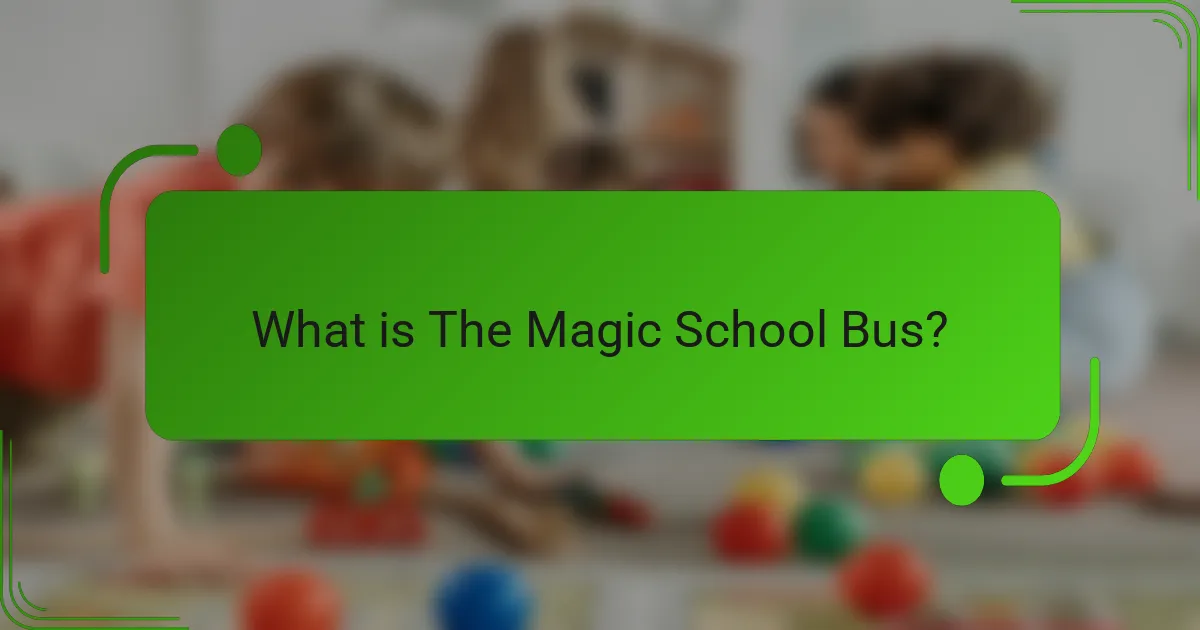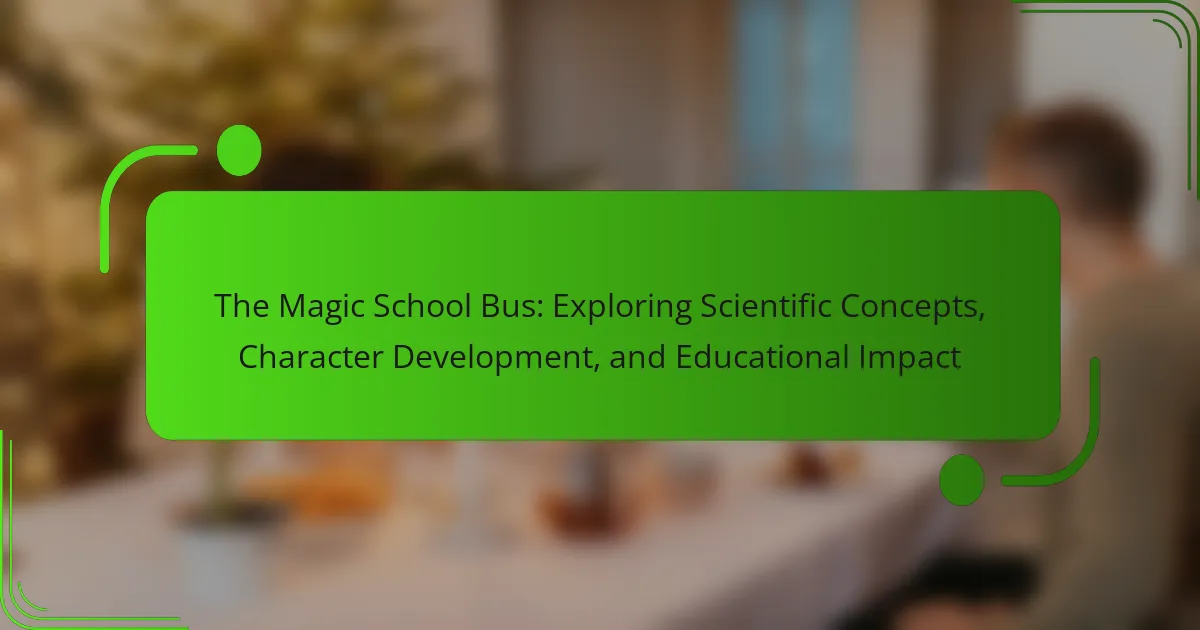The Magic School Bus is an educational animated television series that aired from 1994 to 1997, featuring Ms. Frizzle and her class on transformative field trips that explore various scientific concepts. Each episode focuses on a distinct scientific topic, making complex ideas accessible and engaging for children. Based on a book series by Joanna Cole and Bruce Degen, the show has garnered praise for its creativity and educational impact, contributing to children’s understanding of science through entertaining storytelling and character development. This article will examine the show’s exploration of scientific concepts, character dynamics, and its overall influence on education.

What is The Magic School Bus?
The Magic School Bus is an educational animated television series. It originally aired from 1994 to 1997. The show follows Ms. Frizzle and her class on magical field trips. They explore scientific concepts through adventures in a transforming school bus. Each episode focuses on a specific scientific topic. The series is based on a book series by Joanna Cole and Bruce Degen. It aims to make science engaging for children. The show has received praise for its educational content and creativity.
How does The Magic School Bus engage with scientific concepts?
The Magic School Bus engages with scientific concepts through immersive storytelling and hands-on experiments. Each episode features Ms. Frizzle taking her class on adventures that explore various scientific principles. The show covers topics like biology, chemistry, and physics. For instance, in the episode “Inside Ralphie,” students learn about the human body by shrinking down and exploring it. This method of learning encourages curiosity and critical thinking. The series also incorporates accurate scientific facts and terminology. Educational organizations have praised its ability to make complex subjects accessible and entertaining.
What are the primary scientific themes explored in The Magic School Bus?
The primary scientific themes explored in The Magic School Bus include biology, chemistry, physics, and ecology. Each episode focuses on a specific scientific concept. For instance, episodes delve into the human body, ecosystems, and chemical reactions. The show presents complex ideas in an engaging manner. It encourages curiosity and a love for science. The educational impact is significant, making science accessible to children. These themes are reinforced through hands-on adventures and imaginative storytelling.
How do the adventures in The Magic School Bus illustrate these scientific concepts?
The adventures in The Magic School Bus illustrate scientific concepts through engaging storytelling and hands-on exploration. Each episode focuses on a specific scientific principle, such as biology, chemistry, or physics. For example, in “Inside Ralphie,” the class shrinks to explore the human body, demonstrating concepts of anatomy and physiology. In “The Magic School Bus Inside a Hurricane,” the students learn about weather patterns and the water cycle. The show’s format allows students to visualize complex ideas in an entertaining way. By presenting science in relatable scenarios, the series fosters curiosity and encourages learning. The integration of humor and adventure makes scientific concepts accessible to children.
What role do characters play in The Magic School Bus?
Characters in The Magic School Bus serve as educational tools and relatable figures for young viewers. Each character embodies different traits and interests, promoting diversity and teamwork. Ms. Frizzle, as the teacher, drives the narrative and encourages curiosity about science. The students, like Arnold and Phoebe, represent various reactions to learning, from enthusiasm to reluctance. Their interactions illustrate problem-solving and critical thinking. The characters’ adventures make complex scientific concepts accessible and engaging. This approach fosters a love for learning in children, enhancing educational impact.
Who are the main characters in The Magic School Bus?
The main characters in The Magic School Bus are Ms. Frizzle, Arnold, Wanda, Carlos, Phoebe, and Tim. Ms. Frizzle is the adventurous teacher who leads the class on educational trips. Arnold is known for his cautious nature and often expresses concern during the trips. Wanda is a smart and resourceful student who enjoys science. Carlos is the enthusiastic class clown who brings humor to the group. Phoebe is the thoughtful and observant student who often provides insights. Tim is the quiet yet curious member of the class who enjoys learning. These characters collectively explore various scientific concepts throughout the series.
How do character traits influence the narrative in The Magic School Bus?
Character traits significantly influence the narrative in The Magic School Bus. Each character’s unique attributes drive the story and shape the educational journey. For example, Ms. Frizzle’s adventurous spirit encourages exploration and curiosity. Arnold’s cautious nature often highlights the importance of safety and critical thinking. Phoebe’s empathy fosters teamwork and problem-solving among peers. Carlos’s creativity leads to innovative solutions during challenges. These traits create dynamic interactions that enhance the learning experience. The diverse personalities ensure that various scientific concepts are approached from multiple perspectives. This character-driven narrative effectively engages young audiences while teaching valuable lessons.
What is the educational impact of The Magic School Bus?
The educational impact of The Magic School Bus is significant in promoting science literacy among children. The series introduces complex scientific concepts in an engaging and accessible manner. It combines storytelling with educational content, making learning enjoyable. Research indicates that children exposed to this series demonstrate improved understanding of scientific principles. The show’s interactive format encourages curiosity and critical thinking. Additionally, it fosters a love for learning through relatable characters and imaginative adventures. The Magic School Bus has become a valuable resource in classrooms, enhancing science education.
How has The Magic School Bus contributed to children’s understanding of science?
The Magic School Bus has significantly contributed to children’s understanding of science by making complex concepts accessible and engaging. The animated series presents scientific topics through imaginative adventures led by Ms. Frizzle. Each episode explores a specific scientific principle, such as the water cycle or ecosystems. This hands-on approach allows children to visualize and relate to scientific phenomena. Research indicates that educational shows like The Magic School Bus improve science literacy among young viewers. The series incorporates humor and storytelling, which enhances retention of information. Additionally, it encourages curiosity and critical thinking by prompting viewers to ask questions. Overall, The Magic School Bus serves as an effective educational tool in introducing science to children.
What feedback have educators provided regarding The Magic School Bus?
Educators have provided positive feedback regarding The Magic School Bus. They appreciate its engaging approach to teaching scientific concepts. The series effectively combines entertainment with education. Many educators note that it sparks students’ interest in science. The show’s characters promote teamwork and curiosity. Teachers use episodes to supplement their lesson plans. They find the content age-appropriate and informative. Overall, educators view it as a valuable educational resource.
How does The Magic School Bus foster curiosity in young learners?
The Magic School Bus fosters curiosity in young learners by engaging them in interactive scientific adventures. Each episode presents complex scientific concepts in a fun and relatable way. The characters encourage exploration and questioning, making science accessible. The show’s imaginative scenarios spark interest and wonder about the natural world. By using humor and creativity, it captivates children’s attention. This approach promotes critical thinking and encourages students to ask questions. Research shows that interactive learning experiences enhance curiosity and retention of knowledge. The series effectively combines education with entertainment, making learning enjoyable.
What techniques does The Magic School Bus use to make science accessible?
The Magic School Bus uses engaging storytelling and vibrant animation to make science accessible. The series incorporates relatable characters who demonstrate curiosity and teamwork. It presents complex scientific concepts in simplified, digestible formats. Each episode features interactive elements that encourage viewer participation. The show uses real-world applications to illustrate scientific principles. Educational humor is employed to maintain viewer interest. The incorporation of diverse scientific fields broadens the scope of learning. This multifaceted approach ensures that science is both fun and informative for children.
How do visual storytelling and humor enhance learning in The Magic School Bus?
Visual storytelling and humor significantly enhance learning in The Magic School Bus by making complex scientific concepts accessible and engaging. The use of vibrant animations captures students’ attention and stimulates visual learning. This approach helps to illustrate abstract ideas, such as cellular processes or ecosystems, in a concrete manner. Humor is integrated into the narrative, making the learning experience enjoyable and memorable. It encourages students to engage with the material rather than passively absorb information. Research indicates that humor can improve retention of information by creating positive emotional connections to the content. The combination of these elements fosters a deeper understanding of science, promoting curiosity and a love for learning.
What are some memorable episodes that exemplify effective teaching?
“Inside Ralphie’s Head” exemplifies effective teaching through its exploration of the human brain. In this episode, Ms. Frizzle takes her students on a journey inside Ralphie’s head. They learn about brain functions and the importance of neurons. The episode uses engaging visuals to explain complex concepts. It encourages curiosity and critical thinking among students. The narrative effectively demonstrates how interactive learning can enhance understanding. Research shows that experiential learning significantly improves retention and comprehension in students. This episode is a prime example of integrating fun with education.
What are best practices for incorporating The Magic School Bus into educational settings?
Integrating The Magic School Bus into educational settings involves using its engaging content to enhance learning. Teachers should align episodes with curriculum topics. This ensures relevance and maximizes educational impact. Incorporating hands-on activities related to the episode can deepen understanding. For example, after watching an episode on ecosystems, students could create a mini-ecosystem in class.
Discussion sessions following episodes can promote critical thinking. Students can share their observations and ask questions. Utilizing supplementary materials, such as worksheets or quizzes, can reinforce key concepts. Research shows that multimedia resources can enhance retention of information. According to the Journal of Educational Psychology, students benefit from varied instructional methods.
Lastly, fostering a collaborative environment encourages group projects based on episodes. This approach not only builds teamwork skills but also solidifies knowledge gained from the series.
The Magic School Bus is an educational animated television series that aired from 1994 to 1997, created to make science engaging for children through the adventures of Ms. Frizzle and her class. The show covers a range of scientific concepts including biology, chemistry, physics, and ecology, using immersive storytelling and hands-on experiments to foster curiosity and critical thinking. Key characters embody various traits that enhance the narrative and learning experience, while the series has received positive feedback from educators for its effective teaching methods and ability to promote science literacy. The article explores the show’s impact on children’s understanding of science, techniques for making complex concepts accessible, and best practices for integrating the series into educational settings.
